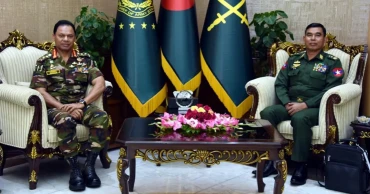Myanmar army
Residents say Myanmar army killed 17 people in 2 villages
Soldiers in Myanmar rampaged through several villages, raping, beheading and killing at least 17 people, residents said, in the latest of what critics of the ruling military say are a series of war crimes since the army seized power two years ago.
The bodies of 17 people were recovered last week in the villages of Nyaung Yin and Tar Taing — also called Tatai — in Sagaing region in central Myanmar, according to members of the anti-government resistance and a resident who lost his wife. They said the victims had been detained by the military and in some cases appeared to have been tortured before being killed.
Myanmar has been in turmoil since the military’s February 2021 seizure of power from the elected government of Aung San Suu Kyi prompted nationwide peaceful protests that security forces suppressed with deadly force. The violence triggered widespread armed resistance, which has since turned into what some U.N. experts have characterized as a civil war.
The army has been conducting major offensives in the countryside, including burning villages and driving hundreds of thousands of people from their homes. It has faced some of its toughest resistance in Sagaing, in Myanmar’s historic heartland.
The soldiers involved in last week’s attacks were in a group of more than 90 who were brought to the area by five helicopters on Feb. 23, said local leaders of the pro-democracy People’s Defense Forces and independent Myanmar media.
They said the bodies of 14 people, including three women, were found Thursday on a small island in a river in Nyaung Yin. Three more male victims were found in Tar Taing, including two members of the local resistance. One of the two was dismembered, with his head cut off, they said.
The neighboring villages are about 45 kilometers (28 miles) west of the major city of Mandalay.
Tar Taing resident Moe Kyaw, 42, survived the attack but said his 39-year-old wife, Pan Thwal, and 18-year-old nephew were among those killed. Contacted by phone, he said Friday they were among 70 villagers detained in the middle of the night last Wednesday by soldiers who shot into the air as they herded their captives from their homes to the local Buddhist monastery.
Moe Kyaw said the soldiers stole beer and other items from his aunt’s small shop, and as they beat her, he fled for his life, escaping two soldiers who shot at him.
He said his wife and other villagers were tortured at the monastery and then taken away from the village, apparently as hostages against any attack. He said his wife and two other women were beaten, raped and shot dead on Thursday by the soldiers, who also took his spouse’s earrings, His two sons, 9 and 11 years old, were released when the soldiers departed, he said.
Moe Kyaw did not explain how he knew the details about his wife’s treatment.
Myanmar’s underground National Unity Government — the main organization opposed to military rule that describes itself as the country’s legitimate government — said in an online news conference on Monday that the soldiers were from the 99th Light Infantry Division based in Mandalay Region.
A leader of a Sagaing resistance group called the Demon King Defense Force said his group attacked the better-armed government troops on Wednesday in a failed effort to rescue the detained villagers.
When they went Thursday morning to the small island where the soldiers had taken about 20 villagers they found 14 bodies in three spots, said the resistance leader, who asked not to be identified because of fear of reprisals by the military.
Acknowledging that he had not seen the killings, he said he also believed the women had been raped.
In an earlier incident apparently involving the same army unit, two boys aged 12 and 13 assisting the People’s Defense Force were captured by government troops on Feb. 26 and beheaded after being forced to show the locations of their camps, according to independent Myanmar media. Photos said to be of their bodies, found at Kan Daw village, about 12 kilometers (7 miles) northwest of Tar Taing, were circulated on social media.
A separate group, the Sadaung Lighting People’s Defense Force, has said that two of its older teenage members were also killed and beheaded in fighting at Kan Daw on the same day.
The military government has not responded to the allegations. In the past, it has denied documented abuses and said that casualties occurred in the course of fighting against armed anti-government guerrillas. Online media supportive of the military government have made the same claim about the recent incidents in Sagaing or suggested that they were the result of factional fighting within the resistance.
Myanmar’s military has long been accused of serious human rights violations, most notably in the western state of Rakhine. International courts are considering whether it committed genocide there in a brutal 2017 counterinsurgency campaign that caused more than 700,000 members of the Muslim Rohingya minority to flee to neighboring Bangladesh for safety.
Last week, U.N. High Commissioner for Human Rights Volker Türk accused the ruling generals of carrying out “a scorched earth policy in an attempt to stamp out opposition.”
His agency said credible sources have verified the deaths of at least 2,940 civilians and 17,572 arrests by the military and its allies since the 2021 takeover.
2 years ago
How Myanmar is faring 2 years after army ousted Suu Kyi
Two years after Myanmar’s generals ousted Aung San Suu Kyi’s elected government, thousands of people have died in civil conflict and many more have been forced from their homes in a dire humanitarian crisis.
Myanmar’s economy, once one of the fastest growing in Southeast Asia, now lags behind where it stood before the Feb. 1, 2021, military takeover compounded the country’s struggles with the pandemic.
Ten years earlier, Myanmar had emerged from decades of military rule, gradually transitioning to a civilian government, opening its economy to more foreign investment and entrepreneurship and relaxing censorship of the media.
A modern consumer culture took hold, with glitzy shopping malls in the biggest city, Yangon, and use of Facebook and cellphones the new normal. The army takeover brought thousands into the streets in peaceful protests that were suppressed with lethal force.
WHAT HAPPENED ON FEB. 1, 2021?
The army arrested Suu Kyi and top members of her governing National League for Democracy party, which had won a landslide victory for a second term in a November 2020 general election. The army said it acted because there had been massive voting fraud, but independent election observers did not find any major irregularities. Senior Gen. Min Aung Hlaing, best known for his role in a 2007 crackdown on pro-democracy protests, now leads the government.
The ouster of the civilian government provoked widespread demonstrations and civil disobedience. As weeks dragged on, security forces crushed shows of opposition with violence. So far, nearly 3,000 civilians have been killed and tens of thousands forced from their homes by fighting between security forces and civilians who took up arms, sometimes allying themselves with ethnic armed groups that have been fighting for autonomy for decades.
Read: UN chief backs democracy for Myanmar 2 years after coup
The military’s seizure of power drew international condemnation. Many governments have shunned the army-led leadership and imposed sanctions, cutting off some financial flows. But neighboring countries in Southeast Asia and Myanmar’s most powerful ally, China, have balked at taking such actions.
WHERE IS AUNG SAN SUU KYI?
Nobel Peace Prize laureate Suu Kyi, 77, was the de facto head of government, holding the title of state counsellor, when the army arrested her and took power. In December a court sentenced her to seven years in prison for corruption in the last of a string of politically tinged criminal cases against her, leaving her with a total of 33 years to serve in prison.
Suu Kyi’s supporters and independent analysts say the numerous charges against her and her allies were an attempt to legitimize the military’s seizure of power while eliminating her from politics before an election promised for later this year.
Suu Kyi, the daughter of Myanmar’s martyred independence hero Gen. Aung San, spent almost 15 years as a political prisoner under house arrest between 1989 and 2010. She is being held in a newly constructed separate building in the prison in the capital, Naypyitaw, near the courthouse where her trial was held.
WHAT IS LIFE LIKE UNDER MILITARY RULE?
Two years after the army seized power, life in Yangon and other big cities has inched back toward normality but fighting in much of the countryside has left the country deeply mired in civil conflict.
Read: China accuses Washington of abusing export controls
Rights advocates say the military and security forces have carried out arbitrary arrests, torture and other abuses to quash dissent. Human rights monitoring groups said Tuesday that Myanmar’s military is increasingly turning to airstrikes with deadly results to try to crush stiff armed resistance,
While the military is responsible for massive use of violence throughout the country, militants in the opposition have carried out bombings and assassinations of military officials and their supporters. Min Aung Hlaing on Tuesday accused opponents of army rule of trying to take power with “wrongful forcible means.”
The World Bank forecasts the economy will grow a meager 3% this year, with some strength in agriculture and industries such as garment making. But it remains smaller than it was in 2019, before the pandemic and then the military takeover.
The military’s return to power has stymied a decade of reforms and left 40% of the population living in poverty.
Despite stringent foreign exchange controls and uncertainty over rules and regulations under army rule, some businesses are finding ways to operate by using informal payments and trade channels. The reopening of Myanmar’s trade routes with China also has helped.
But risks have been heightened by security issues due to the civil conflict.
WHAT LIES AHEAD?
The way out of the crisis remains unclear. The military-controlled government enacted a law on registration of political parties that will make it difficult for opposition groups to mount a serious challenge to army-backed candidates in the general election set to take place later this year.
Critics have already said the military-planned election will be neither free nor fair because there is no free media and most of the leaders of Suu Kyi’s National League for Democracy party have been arrested.
The party has declared it will not accept or recognize the election, which it has described as “fake” and a ploy by the military to gain political legitimacy and international recognition. The vote is also opposed by the National Unity Government, which was established by elected lawmakers who were prevented from taking their seats when the army seized power and serves as an underground parallel national administration.
Units of the People’s Defense Force, the armed wing of the banned pro-democracy movement, have been attempting to disrupt preparations for the election by attacking personnel of the military government who are conducting a population survey that could be used to assemble voter rolls.
3 years ago
Bangladesh Army asks Myanmar Army to be cautious during operations at common border
Bangladesh Army has asked the Myanmar Army to maintain more caution in conducting its operations along the common border areas.
A three member delegation of Myanmar Army led by Lt Gen Phone Myat, Command Bureau of Special Operation visited Bangladesh Army Chief General SM Shafiuddin Ahmed at the Army Headquarters on October 26, according to a press release of Inter-Services Public Relations (ISPR) issued on Thursday night.
The delegation highlighted the ongoing security situation in Myanmar during the visit apart from exchanging courtesies. It said they are trying to keep their country’s peace and discipline under control while maintaining mutual friendship with Bangladesh.
3 years ago
Fear grips border areas as Myanmar fighter jets fire towards Bangladesh
Within days of firing mortar shells, fighter jets of Myanmar army have fired bullets towards Bangladesh this time, which have created panic among people living at the border.
According to Dil Mohammad Alam, a local union parishad member of Tombru area under Naikhongchhari’s Ghumdhum union, Myanmar fighter jets fired 10-15 bullets between border pillar number 34 and 35 on Friday at about 10:45pm.
“Besides firing, sporadic sounds of explosions were also heard throughout the day,” Dil Mohammad said.
Amir Hamza, a local trader, said that although sounds of firing bullets and mortar shells between other pillars of Naikhongchhari remained suspended for the time being, this hasn’t been the case for pillar number 34 and 35.
Read: Unexploded mortar shells found near Bangladesh-Myanmar border
“It seems like the latest round of firing is taking a permanent shape with the passing of time. All of us living in this part of the border are fearing for our lives as the intermittent sound of firing isn’t showing any sign of stopping,” Amir said.
According to sources, the locals also heard the sounds of a total of four explosions at 8:00am, 5:10pm, 5:28pm and 6:00pm.
3 years ago
In Myanmar’s hinterland, army uproots ethnic Karen villagers
In the jungles of southeast Myanmar, the army was shooting and otherwise tyrannizing civilians long before last month’s military coup.
4 years ago
Fleeing coup, Myanmar refugees in India seek asylum
Police officers who defied the Myanmar army’s orders to shoot opponents of the coup and escaped to India are urging Prime Minister Narendra Modi’s government to not send them back and provide them political asylum on humanitarian grounds.
4 years ago
Myanmar police raid housing of striking railway workers
Myanmar security forces early Wednesday raided a neighborhood in the country's largest city that is home to state railway workers who have gone on strike to protest last month's military coup.
4 years ago
Myanmar crisis heightens with police raids and strike call
Myanmar careened deeper into crisis, as police occupied hospitals and universities and reportedly arrested hundreds of people involved in protesting last month’s military seizure of power, while a coalition of labor unions called a strike for Monday.
4 years ago
YouTube removes Myanmar army channels; UN to meet on crisis
YouTube removed five channels run by Myanmar’s military for violating its guidelines, it announced Friday, as demonstrators defied growing violence by security forces and staged more anti-coup protests ahead of a special U.N. Security Council meeting on the country's political crisis.
4 years ago
1 month in Myanmar under military control
The hopes of building a robust democracy in Myanmar were shattered when the powerful military toppled the elected government of Aung San Suu Kyi and her National League for Democracy party in a coup Feb. 1.
5 years ago




.jpg)
.jpg)
.jpg)
.jpg)

.jpg)




